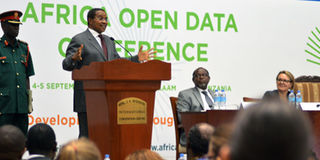Tanzania moves to make it easy to access official data

President Jakaya Kikwete addresses the Africa Open Data conference in Dar es Salaam yesterday. Centre is Chief Secretary Ombeni Sefue and World Bank country director Bella Bird. PHOTO | OMAR FUNGO
What you need to know:
The move is designed to enhance for public access to government data in a friendly manner
Open data is the idea that certain data should be freely available to everyone to use and republish as they wish, without restrictions from copyright, patents or other mechanisms of control. The goals of the open data movement are similar to those of other “Open” movements such as open source, open hardware, open content, and open access. The philosophy behind open data has been long established (for example in the Mertonian tradition of science), but the term “open data” itself is recent, gaining popularity with the rise of the Internet and World Wide Web.
Dar es Salaam. Tanzania is preparing an Open Data Policy that will guide the country on how to obtain and use data, according to President Jakaya Kikwete. The policy, which is expected to be in place in six months, will develop procedures to identify the government’s open data, an institutional framework for open data management, a single window and where the public can access data. Procedures for uploading and updating data will also be defined.
“With the guidelines and the policy in place, it will be mandatory for ministries, government departments and agencies to provide data to the National Bureau of Statistics,” said Mr Kikwete. “Failing to do so will give NBS the power to take action.”
The move is designed to enhance for public access to government data in a friendly manner that allows use and re-use of data for socio-economic development, ultimately leading to an Open Data Act.
Lack of quality data has been the biggest challenge to planning, policy making and policy execution in Tanzania.
A number of policies and interventions have consequently failed to achieve the intended impact.
Budgetary constraints, poor infrastructure and lack of qualified human capital have been mentioned as the biggest drawbacks to producing quality data.
Speaking at the launch of the first Africa Open Data Conference in Dar es Salaam, Mr Kikwete said that no successful and meaningful development will take place without access to data. He added: “Data assists us with diagnosis of social and economic challenges, informs policy choices and decisions and helps us monitor and evaluate progress and impact. Much as data does not in itself, change the world, it is also true, however, that it makes change possible.”
In January 2015, President Kikwete said, the country endorsed the guidelines for Open Data in Tanzania which serve as a tool for ministries, Government departments and agencies to provide data to the Open Data Government Portal. Speaking in Dar es Salaam last week, NBS Director General Albina Chuwa said Tanzania would cut by half the cost of gathering data if the country invests heavily on data revolution.
The country now spends at least Sh1 billion to include a single question in a survey when that cost can be reduced to as low as Sh500 million if the data revolution takes place. If this is to happen, NBS will need Sh2 billion this financial year but the budget allocated to it as low as Sh300 million.
“Those who collect the data are mainly agriculture station workers who are not employed to do the job,” Dr Chuwa said. “We believe mobile applied technology can help us transform.”
The World Bank Group country director for Tanzania, Ms Bella Bird, said a true data revolution would draw on existing and new systems to fully integrate statistics into decision-making and promote open access to and use of data.
She urged Tanzania and Africa in general to ensure that open data is not just about releasing data but also about making good data available and user-friendly. “Without the evidence and measurement that data makes possible, designing effective public policies and investments to improve the lives and future prospects of poor families is difficult, at best,” said Ms Bird. Investing in open data also has value not only for economic growth but also for effective governance. “When public datasets are accessible, they provide the raw material for both government and business applications that can improve lives through better services and improved accountability.”




